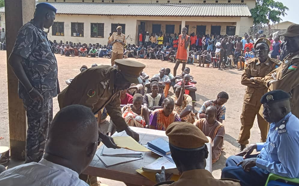A United Nations Development Programme (UNDP)–supported mobile court operating in Bor, the capital of Jonglei State, has ordered the release of 57 prison inmates, including 9 women, who were serving minor sentences.
The court also reviewed 35 criminal suits; squashed 6 and sentenced 29 offenders to prison terms. Some of the convicted offenders were also fined. The move is part of an ongoing initiative to decongest prisons, clear case backlogs, and strengthen access to justice in the region.
According to Wilfred Gitara, UNDP Rule of Law Officer, who is implementing the Access to Justice, Human Rights, and Security Strengthening project in Jonglei State and the Greater Pibor Administrative Area, the mobile court will be active for a period of 30 working days.
“This initiative came as a result of a case backlog with over 600 criminal cases pending before statutory courts, which overwhelmed the small number of justices in the state. The mobile court started work on 27 October, last month, and it will conclude on 26 November, making a total of 30 days. However, discussions are underway to extend for a recommended period,” he explained. “Within a period of two weeks, by 15 November, 101 out of 422 total inmates’ case files were reviewed by the judge at the Bor Central Prison. Out of those, only 57 individuals benefited from release. This means the rest were either still serving their sentence terms or are still undergoing trial.”
Authorities in Jonglei State, in collaboration with the UNDP and UNMISS, launched a mobile court last month to expedite judicial processes, alleviate overcrowding in detention facilities, and extend legal services to remote areas. The court involves teams of four judges, four prosecutors, six defense and victims’ advocates, and administrative support staff traveling across counties to hear cases.
Since 2017, UNDP, with funding from the Kingdom of the Netherlands and support from the UNMISS Rule of Law and Security Institutions Section, has deployed mobile courts nationwide to promote accountability and deliver timely justice to underserved communities.




